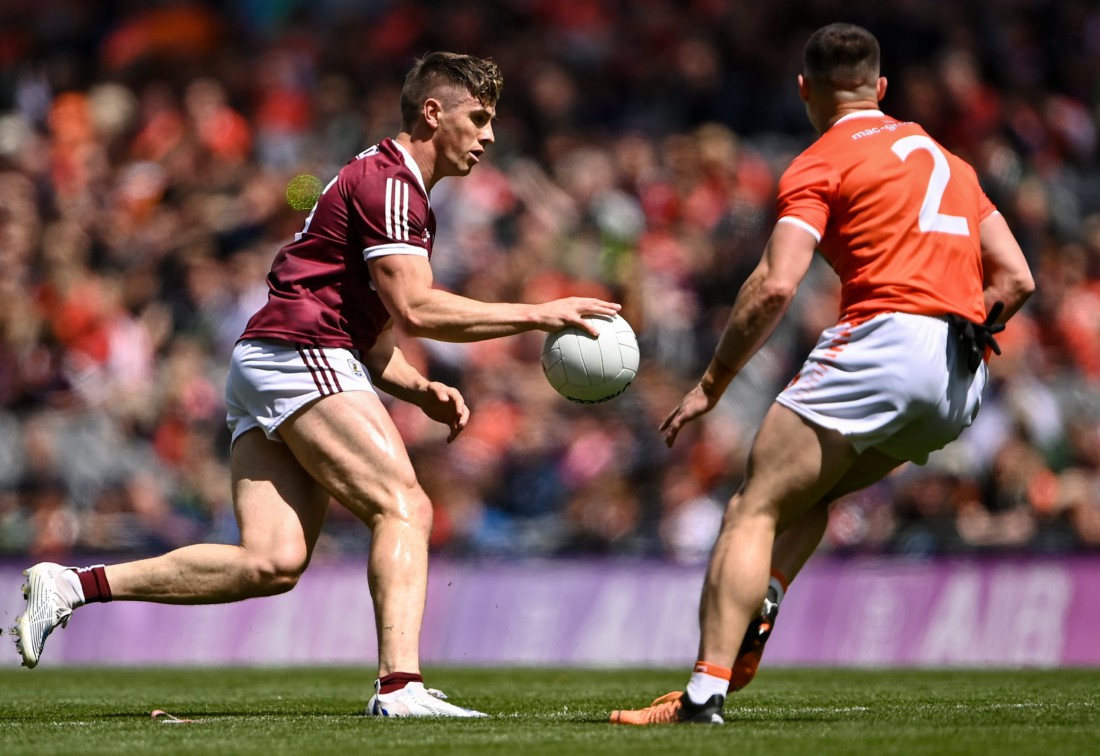By Declan McCoy
I WAS fortunate enough to have been in Croke Park last year to witness one of the best games of football in years when Armagh played Galway in the All-Ireland quarter final. The game was action-packed with quality, drama and, of course, controversy.
One incident that I have spoken to a lot of fellow Armagh supporters about was the final Galway kick-out in extra time. Jemar Hall had just put Armagh one point up and the game was approaching the end of extra-time.
On a side note, his choice to go for a point instead of a goal was debated quite a bit. I think Jemar took the right option taking a guaranteed point as he may have been blocked down if he opted to go for goal as Galway had a defender coming across. He needed to evade this defender and beat the goalkeeper to nail the three-pointer.
On reflection, putting his team one point to the good at that late stage of the game was the correct option in my mind.
Returning to the original topic, after Jemar scored the next play was perilously close to the final whistle. The next point cannot be debated. If Galway didn’t score in the next play Armagh would have been into the semi-final.
If we cast our minds back to what happened next we will be moving firmly into the realm of debate. Firstly, the atmosphere when Armagh took the lead and also when Rian O’Neill nailed that monster free was electric. It was probably up there with anything I’ve experienced in Croke Park supporting Armagh, with the possible exception of Kieran McGeeney’s late point against Kerry in the All-Ireland semi-final of 2000. I would encourage anyone to watch the last ten minutes of that game on YouTube as the crowd noise would send shivers down the spine.
When Galway were set to take their last kick-out of the game, I was looking for my children as I’d launched them in the air when celebrating taking the lead and was busy hugging random strangers when caught up in the euphoria.
Kieran Donaghy then raced on to the pitch to instruct the players to drop off the kick-out. Galway kicked the ball short, completed five passes and Cillian McDaid hit the leveller. The game then went to penalties and Armagh, unfortunately, hit a few that would make Harry Kane blush.
When analysing the decision of Armagh to drop off that kick-out, we need to look at all the evidence available to us. We also have to dismiss the notion that if Armagh pushed up they definitely would have won the game. This may very well have been the case but they also could have pushed up and lost the long kick out and Galway would still have scored. If Armagh pushed and lost it you would have had the same reaction. People would then be suggesting that we should have dropped off the kick-out.
The fact of the matter is Armagh dropped and lost but the notion they would have won on a press is only hypothetical. As it never actually happened we have two possible outcomes, it either would have worked or it wouldn’t have. To automatically assume a predicted outcome on a hypothetical scenario is flawed as it is not evidence based.
Misconceptions:
1) It was the last play of the match and that kick-out was the last action. It wasn’t, there was one minute of extra-time left as two minutes of injury time had been signalled.
2) Galway had an injured man so Armagh had an extra man and should have pushed up to choke the kick-out. The referee stopped play for the injury of Dylan McHugh and allowed Galway to substitute him with Cathal Sweeney.
3) That Armagh dropped off effectively. This is a massive point to consider. The assumption is that Armagh dropped off their kick-out and this was a mistake. They did indeed drop off but they subsequently missed three tackles by several players moving towards the ball carrier at once leaving space in behind.
They did the same for Donegal’s goal against them in the Ulster Championship. You should only commit multiple tacklers to the ball carrier when he has been stopped or wrapped up. If this isn’t the case you will take two or three of your own players out of the game and leave space for runners.
4) The game was over after Galway levelled. Armagh, in fact, had another kick-out that Galway pushed up on and subsequently lost when bringing the ball into traffic. This presented Armagh with a glorious chance to win only for Niall Rowland’s shot to drift wide.
On reflection it was a highly pressurised environment and a tough decision had to be made that was always going to be scrutinised if it didn’t work out. That is what managers and coaches must do, make brave decisions. As Tony Soprano said, “more is lost to indecision than wrong decision”.
I am a proponent of pushing opposition kick-outs but I’m also a proponent of game management. In this scenario I would have dropped off the kick-out knowing Galway would have 100 metres to carry the ball and 15 Armagh players to beat.
In my opinion, the missed tackles were the downfall here, not the strategy.
I’m sure many will disagree but healthy debate is part of the fabric of our great games.
Receive quality journalism wherever you are, on any device. Keep up to date from the comfort of your own home with a digital subscription.
Any time | Any place | Anywhere












